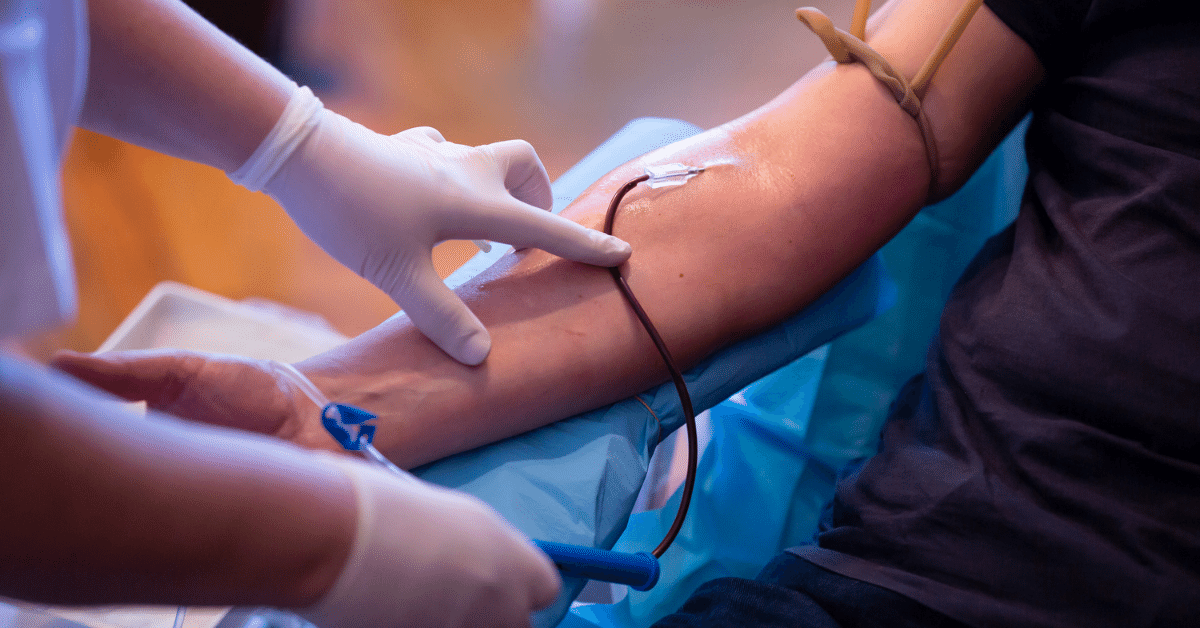Since she was a teenager, Amanda Fouch has given blood. “I felt so excited about being able to give something to someone that could save their life, with the added benefit that all it cost me was a little bit of time,” the high school student told Yahoo Life of the blood drive that took place.
Since then, the 42-year-old has persisted in giving blood at least twice a year. “I am a universal donor because I am O negative. Since I’m fortunate enough to have something that is so needed and useful for so many others, I feel obligated to give it away,” adds Fouch.
The American Red Cross states that giving blood not only saves hundreds of lives annually but also enables numerous medical treatments and procedures. A Red Cross representative tells Yahoo Life that donors can aid cancer patients, accident victims, new moms who bleed after childbirth, those undergoing surgery or receiving a transplant, and people receiving treatment for long-term illnesses including sickle cell disease.
In the United States, someone requires blood every two seconds. The fact that the United States is currently experiencing a blood shortage emergency—the lowest number of blood donors in the last 20 years—adds even more urgency.
“Almost everyone is affected by the need for blood, whether they realize it or not, as the majority of us know someone who has had a transfusion,” a Red Cross representative states. “It is impossible to produce blood; the only source is kind donors who are prepared to roll up their sleeves and donate an hour or so of their time.”
It may surprise some people to learn that blood donations benefit more than simply the beneficiaries. According to the Red Cross, “donating blood not only benefits patients in need of medical attention, but it also helps save lives.” These are a few unexpected health benefits of blood donation.
Giving blood allows your vital signs to be checked.
As soon as you arrive at a blood donation facility, the staff takes your vital signs, blood pressure, and heart rate to determine whether you are eligible to give, according to Yahoo Life’s interview with Dr. Anjali Bharati, an emergency medicine specialist at Lenox Health Greenwich Village. In addition, they screen your blood for infectious disorders including HIV and hepatitis, as well as anemia and iron deficiency.
A medical problem like high blood pressure, an irregular heartbeat, or anemia may be discovered by these screening tests, according to Bharati. “This is an important evaluation, but it doesn’t replace a trip to the doctor.”
According to the Red Cross, vital signs from every donation are documented in each donor’s safe online account, making it simple for them to monitor their health statistics. A representative for the Red Cross adds, “You can view your vital statistical trends over time and share this information with your health care provider. It can help you monitor for health conditions like high blood pressure.”
It can increase the risk of a heart attack and reduce blood pressure.
Bone marrow makes the protein known as hemoglobin. Hemoglobin, which is stored in red blood cells, helps these cells carry oxygen from your lungs into your body through your arteries. Either low or high hemoglobin levels can cause fatigue, lightheadedness, or dyspnea.
Donating blood lowers the blood’s viscosity, which is a measurement of the blood’s thickness and stickiness, for those with high hemoglobin levels. The blood’s viscosity has been linked to heart attacks, strokes, and blood clots.
High hemoglobin individuals can gain from giving blood. Lower hemoglobin levels can lower your chance of having a heart attack and stroke. Additionally, it can reduce blood pressure, according to Bharati.
Certain genetic diseases can benefit from blood donation.
The condition known as hereditary hemochromatosis results in an accumulation of extra iron in the blood. It is advantageous to donate blood for this ailment. According to Bharati, “regular blood donation can remove these irons, which can improve someone’s health.”
It improves mental well-being.
Studies reveal that giving blood and other acts of kindness can have a significant effect on mental health and wellbeing, lowering stress and elevating mood and self-esteem, among other benefits.
According to a Red Cross spokeswoman, “The greatest benefit to the donor is the good feeling of knowing you are helping to save the life of someone in need, which no doubt touches countless other lives as well.”
Bharati points out that giving back to your community generally makes you feel better. “Donating one pint of blood can save up to three lives, which is a significant act of generosity. Your mental health will greatly benefit from knowing that you are engaged in something meaningful, the speaker claims.
Advice to think about before giving blood
If you donate whole blood, which is approximately one pint, you can do so every eight weeks; if you donate Power Red, which is approximately two pints, you can do it every sixteen weeks. The actual blood draw takes eight to ten minutes on average, while the total donation process takes around an hour.
Use these pointers before donating blood to help make sure everything goes smoothly:
- In the weeks before your donation, eat foods high in iron and stay away from caffeine if you typically have low iron levels to give your body an extra iron boost.
- Start consuming a lot of water the day before.
- Make sure you get enough rest the night before.
- Before attending the blood drive, eat a meal.
- Steer clear of caffeine and alcohol both before and after giving blood.
- Exercise before your visit, not after, if you intend to work out, as it’s normal to feel weak and lightheaded after giving blood.
- Bring a buddy to your appointment, and while you support each other, urge them to contribute as well.

Leave a Reply